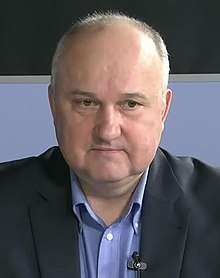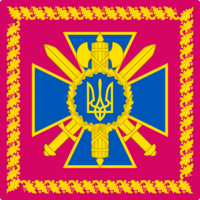Ihor Smeshko
Colonel General Ihor Petrovich Smeshko (born 17 August 1955) served as the head of the Security Service of Ukraine (SBU) from 2003 to 2005, where he supported the opposition during the Orange Revolution.[1] In 2010, he entered politics with the Strength and Honor party, which he formed with several former security and intelligence officials.[2]
Ihor Smeshko | |
|---|---|
 | |
| Head of the Security Service of Ukraine | |
| In office 4 September 2003 – 4 February 2005 | |
| Preceded by | Leonid Derkach |
| Succeeded by | Oleksandr Turchynov |
| Military Attache of Ukraine in Switzerland | |
| In office October 2001 – September 2000 | |
| Head of the Chief Directorate of Intelligence of the Ministry of Defence | |
| In office 9 June 1997 – 29 September 2000 | |
| Preceded by | Oleksandr Skipalsk |
| Succeeded by | Viktor Paliy |
| Military Attache of Ukraine in the United States | |
| In office August 1992 – July 1995 | |
| Personal details | |
| Born | 17 August 1955 Khrystynivka, Cherkasy Oblast, Ukraine |
| Political party | Strength and Honor Civic Movement |
| Alma mater | Shevchenko National University, Kyiv |
| Website | Official website |
| Military service | |
| Allegiance | |
| Branch/service | |
| Years of service | 1992 - 2005 |
| Rank | Colonel General |
Smeshko was registered as a candidate in the 2019 Ukrainian presidential election.[3] In the election he took 6th place with 6.04% of the vote.[4]
Biography
Born in 1955 in Khrystynivka, Cherkasy Region, Smeshko has made a career as a professional soldier-scholar. He holds a doctorate in Military Cybernetics and served as professor of information systems and systems analysis, publishing over 100 papers. In 1992, he became secretary of the Science Advisory Council of the Ukrainian Ministry of Defense. That same year he was reassigned as Defense Attache to the Ukrainian Embassy in Washington D.C. where he spent 4 years.[5] While there he negotiated a memorandum of military cooperation with the United States during that time. In 1995, Smeshko was awarded a general's star and recalled to Ukraine to lead the president's committee on intelligence, which he did for 3 years. In 1997, Smeshko was appointed Chief Directorate of Intelligence of the Ministry of Defence of Ukraine where he uncovered "massive fraud" in weapons end-user certificate production indicative of arms trafficking at the SBU, then headed by Leonid Derkach. Smeshko implemented stricter controls, particularly for the Kolchuga air defense system.[6]
In 2000, facing political attacks organized by the SBU, Smeshko resigned from his post as head of the Military Intelligence Directorate and assumed the post of Defense Attache to Switzerland[5], a demotion. In this position, he negotiated a memorandum of military cooperation with Switzerland. In 2002, Smeshko completed a masters in Military Administration and a Law Degree from Shevchenko University in Kyiv. In late 2002, Leonid Kuchma asked Smeshko to return to Ukraine to assist him in handling accusations made by the U.S. State Department that Ukraine had sold the Kolchuga system to Iraq. Later that year, Derkach was fired and Smeshko was appointed head of the SBU. He immediately set into action with a plan to preserve documents, replace top management and reorganize the agency with new pay scales and a mission focused away from KGB style secret political police.[1][6]
Smeshko was instrumental in the prevention of military action against the civil protests in late 2004. He demanded General Popkov stop his efforts to crack down on the protesters, as the General was mustering 10,000 troops to do so. The SBU and the military intelligence directorate worked to block the fraudulent ascension of Viktor Yanukovich, supporting Viktor Yushchenko.[1] In 2005, Yushchenko fired Smeshko from the SBU.[6]
In 2014 President Petro Poroshenko appointed Smeshko as his adviser.[5] Subsequently, he led the Intelligence Committee under the President.[5]
Smeshko was a candidate in the 2019 Ukrainian presidential election.[3] In the election he took 6th place with 6.04% of the vote.[4]
Smeshko speaks fluent Russian, English, German and French.[6]
Controversies
Yushchenko poisoning
A parliamentary commission investigating in October 2004 confirmed that Smeshko dined with Yushchenko on the night of September 5, 2004, where he may have been poisoned. Yushchenko claims to have fallen ill about 3 hours after the dinner and sought medical treatment the following day.[6][7][8] Smeshko credibly denies the allegations, citing the existence of several other theories regarding the poisoning, and claims that the allegations were made by Kuchma supporters from within the security services, including former SBU chief Derkach.[6]
References
- C. J. Chivers, BACK CHANNELS: A Crackdown Averted; How Top Spies in Ukraine Changed the Nation's Path, , New York Times, January 17, 2005
- John Marone, Ihor Smeshko, ex-spy chief, enters politics, , Kyiv Post, April 28, 2010
- (in Ukrainian) Zelensky told when he presented his key five team, Ukrayinska Pravda (19 March 2019)
- "Power and Honor party: A fresh rating for the 2019 parliamentary elections". RBC Ukraine (in Ukrainian). 10 June 2019.
- (in Ukrainian) Ex-head of the SBU decided to go to the presidency, Ukrayinska Pravda (13 January 2019)
- George Woloshyn, Ihor Smeshko: The man in the iron mask, , Kyiv Post, Jan. 15, 2010
- Susanna Loof, Doctors say Yushchenko was poisoned,, Associated Press, StAugustine.com, December 12, 2004
- Emma Ross, Yushchenko's dioxin poison level 6,000 times higher than normal, , Associated Press, StAugustine.com, December 16, 2004
- Ryan Mauro, The Other Intelligence Failure, , Front Page Magazine, April 24, 2009
External links
- Official website (in Ukrainian)
See also
| Government offices | ||
|---|---|---|
| Preceded by Oleksandr Skipalsky |
Head of the Chief Directorate of Intelligence of the MDU 1997-2000 |
Succeeded by Viktor Paliy |
| Preceded by Volodymyr Radchenko |
Director of the Security Service of Ukraine 2003-2005 |
Succeeded by Oleksandr Turchynov |
